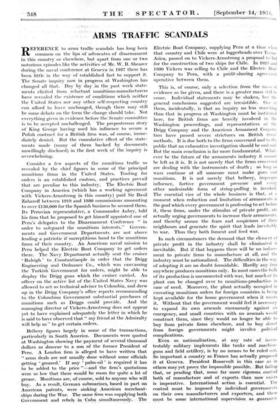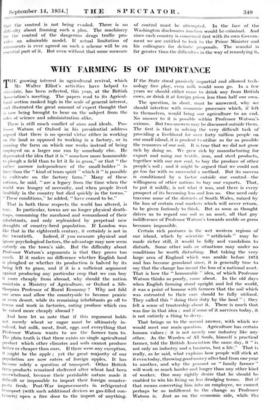ARMS TRAFFIC SCANDALS
REFERENCE to arms traffic scandals has -long been common on the lips 'of advocates of disarmament in this country or elsewhere, but apart from one or two notorious episodes like the activities of Mr. W. B. Shearer during the naval conference at Geneva in 1927 there has been little in the way of established fact to support it. The Senate inquiry now in progress at Washington has changed all that. Day by day in the past week state- ments elicited from reluctant munitions-manufacturers have revealed the existence of conditions which neither the United States nor any other self-respecting country can afford to leave unchanged, thOugh there may still be some debate on the form the change should take. Not everything given in evidence before the Senate committee is to be accepted unchallenged. The preposterous story of King George having used his influence to secure a 'Polish contract for a British firm was, of course, imme- diately. denied. But the cumulative effect of the state- ments made (many of them backed by documents unwillingly disclosed) in the first week of the inquiry is overwhelming.
Consider a .few aspects of the munitions traffic so revealed by the chief figures in some of the principal munitions firms in the United States. Touting for orders is an established custom, and practices prevail that are peculiar to this industry. The Electric Boat Company in America (which has a working agreement with Vickers-Armstrong in this country) paid Sir Basil Zaharoff between 1919 and 1930 commissions amounting to over £150,000 for the Spanish business he secured them. Its Peruvian representative, a Commander Aubry, told his firm that he proposed to get himself appointed one of Peru's -delegates to the Disarmament Conference " in order to safeguard the munitions interests." Govern- . ments and Government Departments are not above lending a patriotic if surreptitious hand to the munitions firms of their country. An American naval mission to Peru helped the Electric Boat Company to get orders there. The Navy Department actually sent the cruiser ' Raleigh ' to _Constantinople .. in order that the Drigg Engineering and Ordnance Co., which was canvassing the Turkish' Government for orders, might be able to display the Drigg guns which the cruiser carried. An officer on the active list of the,United States Navy was allowed to act as technical adviser to Colombia, and drew up in the Drigg Company's office reports recommending to. the Colombian Government substantial purchases of munitions such as Driggs could provide. And the managing director of Vickers-Armstrong does not appear yet to have explained adequately the letter in which he is said to have observed that " my friend at the Admiralty will help us " to get certain orders..
Bribery figures largely in some of the transactions,- particularly in South America. Documents . were quoted at Washington showing the payment of several thousand dollars as douceur to a -son of •the -former President of Peru. A London firm is alleged to have written that " arms - deals are not usually- done -without some officials getting ' greased:' If any ' palm-oil ' -is required it has to be added to the price "—and the firm's quotations were so low that there would be room for quite a lot of grease. Munitions are, of-course, sold to anyone who will buy. - As a result,- German -submarines, based in part on American patents,- were • sinking American merchant- ships during-the War. The same -firm was supplying both Government and rebels in Cuba simultaneously. - The Electric Boat Company, supplying Peru at a time when that country and Chile were at loggerheads over Tacna- Arica, passed on to Vickers-Armstrong a proposal to hid • for the construction of two ships for Chile. In 1929 and 1930 Vickers was selling to Chile and the Electric Boat Company to Peru, with a prat-sharing agreement operative between them. • This is, of course, only a selection from the mass of evidence so far given, and there is a greater mass still to - come. Individual statements may be shaken; but the general conclusions suggested are irresistible. One of them, incidentally, is that an inquiry no less searching than that in progress at Washington must be instituted here, for British firms are heavily involved in the Washington proceedings, and representatives of the Drigg Company and the American Armament Corpora- tion have passed severe strictures on British firms' 'methods. It is due both to the firms concerned and to the public that an exhaustive investigation should be ordered. But the main conclusion is far more fundamental. What- ever be the future-of the armaments industry it cannot be left as it is. It is not merely that the firms concerned arc dealing with the instruments of death ; so long as wars continue at all someone must make guns and munitions. It is not merely that bribery, improper influence, furtive government pressure and every other undesirable form of string-pulling - is invoked. The essential vice of the whole business is that, at a moment when reduction and limitation of armaments is the goal which every government is professing to set before it, these firms, under the stimulus of private profit, are actually urging governments to increase their armament, and thereby arouse the fears and suspicions of their neighbours and generate the spirit that leads inevitably to war. Thus they both foment and feed war.
In such circumstances the demand that the element of private profit in the industry shall be eliminated is inevitable. But if that happens there will be no induce- ment to private firms to manufacture at all, and the industry must be nationalized. The difficulties in the way of adopting it are no doubt formidable. Hardly any liria anywhere produces munitions only. In most cases the bulk of its production is unconnected with war, but much of its plant can be changed over to munitions-production in ease of need. Moreover, the plant actually occupied in executing munitions orders for foreign countries is being kept available for the home government when it wants it. Without that the government would feel it necessary to expand its own arsenals enormously against an emergency, and small countries with no arsenals would construct them, since they would no longer be able to buy from private firms elsewhere, and to buy direct from foreign governments might involve political complications. • Even so_ nationalization, at any rate of incon- testably military implements like tanks and machine- guns and field artillery, is by no means to be ruled out. So important a country as France has actually proposed • it at Geneva. President Roosevelt in this case . as in. others may yet prove the impossible possible.: But failing' that, or pending that, some far • more rigorous., control both of manufacture and of . exports than now exists is imperative. International action is. essential. The control must be imposed . by individual governments on their own manufacturers and. exporters, and there must be some international supervision as .guarantee that the control is not being evaded. There is no difficulty about framing such a plan. The machinery for the control of the dangerous drugs traffic pro- vides an admirable model. If actual limitation of armaments is ever agreed on such a scheme will be an essential part of it. But even without that some measure of control must be attempted. In the face of the Washington disclosures inaction would be teriminal. And since each country is concerned first with its own Govern- ment we are entitled to look to the Prime Minister and his colleagues for definite proposals. The scandal is far greater than the difficulties in the way of remedying it.











































 Previous page
Previous page